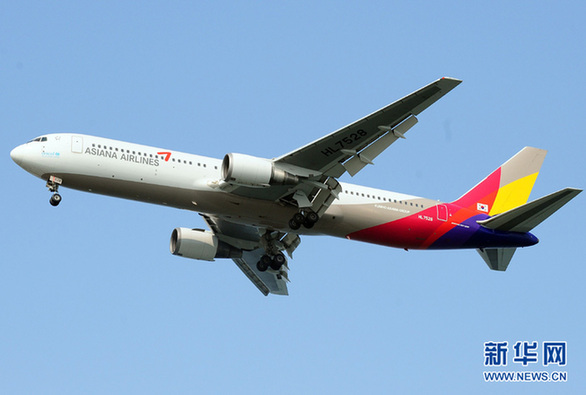ROK passenger plane fired on
 0 Comment(s)
0 Comment(s) Print
Print E-mail
Global Times, June 20, 2011
E-mail
Global Times, June 20, 2011
Shortly before landing, a South Korean passenger jet, departing from China and bound for Seoul, narrowly escaped rifle bullets shot by South Korean marines, who were said to have mistaken the aircraft for a North Korean warplane.
A spokesman of South Korea's Marine Corps said Saturday that two soldiers guarding Gyodong Island near the sea border with the North fired their K-2 rifles at the plane for about ten minutes at around 4 am Friday.
The plane was later identified as an Airbus A320 of the Seoul-based Asiana Airlines with 119 people onboard. It flew from Chengdu, Sichuan Province and was making its descent into Incheon International Airport, Seoul's main airport, when the shooting took place.
Media reports said the plane was flying at an altitude of about 1,500 meters at the time of shooting, outside the rifle's effective range.
Asiana denied claims from the two marines that the plane flew north of the normal air corridor. Citing officials from the Ministry of Land, Transport and Maritime Affairs in Seoul, SBS TV also said that the plane never left the scheduled course.
An employee with the Asiana Airlines Beijing Office told the Global Times that they had not received any notice from their Seoul headquarters about the shooting, and the company's flights were all running as normal.
South Korean media expressed concern over the incident's impact on the country's tourism. In the first five months of this year, about 570,000 Chinese tourists visited South Korea.
A South Korean military official said sea fog had disrupted the soldiers'vision.
"They did what they had been told to do based on military manuals. The action was partly caused by high tensions with the North. We have no plan to punish them for now, given that there was no damage to the plane," the source told AFP.
Following the incident, the Marine Corps will step up training for soldiers to help them distinguish between civilian aircraft and warplanes, the Seoul-based Yonhap news agency reported.
Ding Yifan, a deputy director of the World Development Research Institute at the Development Research Center of the State Council, cast doubt on the military's explanation.
"Civil and military airplanes are very different. It seems that the marines lack basic training in this regard, which poses a threat to any planes passing over that area," Ding told the Global Times.
Asiana should stand up for its passengers and ask for more explanations from the military, Ding said.
Internet users slammed the South Korean military over the shooting.
"With all their training, didn't the South Korean soldiers know their rifles were useless against the plane at that distance?" one user commented on yahoo.com.
Another post on the website of the Hong Kong-based Wenweipo newspaper said, "Apparently the patrol on the Gyodong Island is useless because they were not told to first report the plane to their commanders."
Zhang Zhaozhong, a professor with the PLA National Defense University, told the Global Times that the shooting reflected the weak mentality of some South Korean soldiers and the military's faulty warning system.
"Ground troops are not supposed to deal with enemy warplanes. This time, however, those who are responsible, such as the air force, did not react at all," Zhang noted.
Cai Jian, a deputy director of the Center for Korean Studies of Fudan University, said that recent tensions on the peninsula have made South Korean soldiers even more nervous.
"Ties between the two Koreas grew colder this month after nine North Koreans defected to the South. Pyongyang reacted strongly after Seoul refused to return them, which forced the South to step up its defenses. The place where the shooting occurred is very close to the border, and poor weather also played a part in the marines' blunder," Cai said.
Apart from the drawn-out nuclear issue, a series of confrontations between the two sides in 2010 has fueled tensions on the peninsula.
Seoul accuses Pyongyang of torpedoing the Cheonan warship in March last year, killing 46 sailors – a charge that has been denied by the North. In November, North Korean troops shelled Yeonpyeong Island near their border, killing two people.
In March, South Korean Defense Minister Kim Kwan-jin told frontline troops to strike back in the event of a provocation without waiting for orders from top commanders, AFP reported.







Go to Forum >>0 Comment(s)